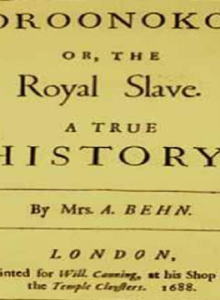Oroonoko

Review of Oroonoko by Aphra Behn ( Slave trade and freedom in Oroonoko )
Aphra Behn wrote Oroonoko in 1688 to depict freedom, slavery, and race at the forefront of English literature. In the 17th century, Suriname functions as the novel’s principal setting whereas its events primarily unfold across South American Suriname as an English colony and derive from an actual African prince’s experiences. Within this novella, Behn presents the life story of noble African prince Oroonoko who becomes a slave after capture in the Americas.
Through his bravery and nobility together with his unyielding strength Oroonoko embodies the necessary tragic hero characteristics. Married to Imoinda the beautiful native woman of his tribe he develops a passionate affection. The central love story of Oroonoko suffers its biggest challenge when a powerful European trader harms Oroonoko by deceiving him into slavery. Oroonoko’s liberation from slavery shows us the brutal treatment that attended the slave trade.
Through an unnamed narrator, we learn about Oroonoko by reporting their experiences from having known him. From the first-person perspective, the narrator presents the native people of Suriname alongside slaves as honorable characters in opposition to the evil ways of the European colony. Through its presentation, the book shows compassion towards how enslaved people suffered and shows they wanted liberation with respect.
Throughout Oroonoko the narrator explores how conflicts between being trapped and finding liberation shape the story’s structure. Oroonoko suffers naked abuse from slavery even though he comes from royal blood and noble lineage. Oroonoko’s efforts against his captivity together with his many escape attempts form an essential part of the story. However, his tragic end serves as a reminder of the overwhelming power of colonial forces and the devastating impact of slavery on individuals and societies.
The writing of Aphra Behn exhibits passionate intensity which rises to great power. Through gripping imagery, Behn conveys a detailed image of Suriname’s wilderness landscape which strengthens readers’ sense of the geographical setting. Through powerful depiction of character psychology, the narrative leads its readers to feel emotionally connected. The dialogue framework together with story-telling conventions from the 17th century maintains a formal tone yet performs timeless delivery of universal themes including romantic love and freedom struggles alongside cases of betrayal.
History confirms Oroonoko as an important literary work of English literature. Through its pages, this work examines significant social matters including slave barbarity racism, and colonial challenges. The historical document written 300 years ago still produces timely insights about human rights and freedom which make this work essential for present-day thinkers. Through her work, Behn created one of the earliest literary examples that fight against societal conventions and promote understanding for those who experience oppression.


